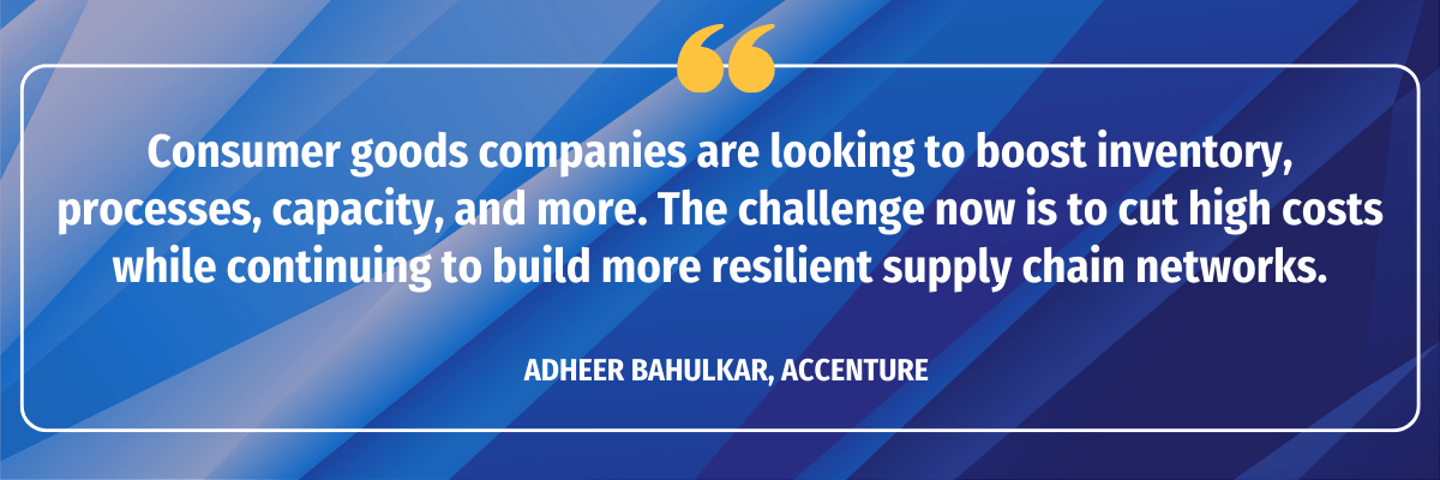What is the Future of Information Technology to Supply Chain?
If consumer goods leaders had three wishes, it’s fairly certain that a crystal ball for the supply chain would muscle its way in for at least one of them. Unlikely to be ever taken for granted again, visibility has become table stakes for success, and AI in the supply chain can serve as a key enabler.
It’s not enough, however, to simply invest in new technology and expect automation to take the reins. The successful future of AI in the supply chain depends upon forward-thinking, well-trained and well-supported IT teams.
What is the role of information technology in supply chain management?
IT teams play an incredibly valuable role in supply chain management in part because they support the infrastructure powering decision-making. While their authority can vary depending upon where they sit within the operational structure and their influence on investment in supply chain technology solutions, they nonetheless typically carry a bird’s eye view of the organization and understand the technical and business needs of each function, including the supply chain.
As a result, expect collaboration to become central to the future of the supply chain. IT teams will need to become partners in both rethinking how they might redesign business processes, as well as how they're thinking of the appropriate cadence for deploying technologies themselves, says Amber Salley, senior director analyst at Gartner.
“Technology is pulling processes along, so it's important for the folks in IT to be present because you don't want folks in the supply chain making technology decisions in isolation,” she notes.
What technologies are reinventing the supply chain?
The importance of technology in the supply chain is best understood by IT teams, and consumer goods companies today realize that a perfect consumer experience is pointless if you can’t get your products on shelves. The tech expected to transform the supply chain includes advanced analytics and big data, IoT, AI and ML, blockchain, edge computing, AR and VR, robotic process automation (RPA), and digital twins, to name just a few.
“Ongoing disruption has taken its toll on the global supply chain. In response, consumer goods companies are looking to boost inventory, processes, capacity, and more,” says Adheer Bahulkar, global supply chain lead of Accenture’s consumer goods and industry practice. “The challenge now is to cut high costs while continuing to build more resilient supply chain networks.”
For consumer goods leaders, today’s focus remains on creating hyper-automation at scale, he adds. “This includes robotics capable of complete situational awareness that ultimately strives towards self-monitoring, self-learning, and self-correcting physical processes from manufacturing to warehousing and transportation.”
However, supply chain leaders would be wise to ensure they’re focusing as much on their people as they are on their technologies, as a disengaged workforce can contribute to low adoption rates and lessen the impact of technology on supply chain management. A recent Gartner survey of supply chain employees found that just 25% of the supply chain workforce is fully engaged with their work, while a mere 16% are willing to go “above and beyond.”
"Introducing new technologies, especially of the magnitude of AI or smart robots, would come with implementation challenges at any time,” said Thomas Pocock, senior director, advisory for Gartner’s supply chain practice. “Any new technology introduced in this environment is likely to be met with elevated levels of mistrust and change fatigue. It’s clear there needs to be a new strategy to make such integrations work for all sides.”
How can information technology solve supply chain problems?
“The reality is that the shelf life of supply chain management solutions is fast shrinking,” says Bahulkar. “As new requirements emerge and new data-led, tech-enabled solutions become feasible, there is a fast ROI opportunity in upgrading point capabilities at a much faster pace than ever before.”
While not a cure-all for today’s challenges, IT teams that shift their way of thinking to be more composable, as well as embrace packaged business capabilities, can also significantly benefit supply chain teams, notes Salley. This includes things such as low code and knowledge graph environments that can align data better to allow for today’s converged supply chain environment.
IT teams are also key for cybersecurity, ensuring data privacy and the integrity of interconnected systems, notes Dr. Ilya Jackson, postdoctoral associate at MIT Center for Transportation and Logistics. What’s more, “they can enable the integration of different supply chain technologies, ensuring smooth communication and collaboration.”
How will supply chains change in the future?
Supply chain technology trends can shift along with the whim of consumer behavior, but it’s expected that a resilient supply chain will continue to serve as a competitive advantage for consumer goods companies.
When looking at the future supply chain, it will operate a trio of commercial innovation capabilities, according to Gartner, all supporting revenue and driving a competitive advantage. This includes:
- Supply chain capabilities "as a service" to other organizations
- A consolidated supply chain service menu
- Operating model modularity and flexibility
Lori Shaffer, Kimberly-Clark VP of global nonwovens, for one, paints an optimistic view of its potential. "What excites me about the future of supply chain is that data availability, technology convergence, and an end-to-end view of the value chain has the potential to transform the consumer experience, making the impossible possible,” she says.



